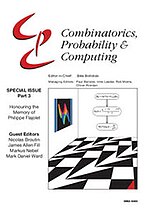Combinatorics, Probability and Computing
 | |
| Discipline | Combinatorics, probability, theoretical computer science |
|---|---|
| Language | English |
| Edited by | Béla Bollobás |
| Publication details | |
| History | 1992–present |
| Publisher | |
| Frequency | Bimonthly |
| Delayed, after 6 months | |
| 1.032[1] (2020) | |
| Standard abbreviations | |
| ISO 4 | Comb. Probab. Comput. |
| MathSciNet | Combin. Probab. Comput. |
| Indexing | |
| CODEN | CPCOFG |
| ISSN | 0963-5483 (print) 1469-2163 (web) |
| LCCN | 92660061 |
| OCLC no. | 26286529 |
| Links | |
Combinatorics, Probability and Computing is a peer-reviewed scientific journal in mathematics published by Cambridge University Press. Its editor-in-chief is Béla Bollobás (DPMMS and University of Memphis).
History[edit]
The journal was established by Bollobás in 1992.[2] Fields Medalist Timothy Gowers calls it "a personal favourite" among combinatorics journals and writes that it "maintains a high standard".[3]
Content[edit]
The journal covers combinatorics, probability theory, and theoretical computer science. Currently, it publishes six issues annually. As with other journals from the same publisher, it follows a hybrid green/gold open access policy, in which authors may either place copies of their papers in an institutional repository after a six-month embargo period, or pay an open access charge to make their papers free to read on the journal's website.[4]
Abstracting and indexing[edit]
The journal is abstracted and indexed in:
According to the Journal Citation Reports, the journal has a 2014 impact factor of 0.623.[9] Since 2007, it has been ranked by SCImago Journal Rank as a first-quartile journal in four areas: applied mathematics, computational theory, statistics and probability, and theoretical computer science.[10]
References[edit]
- ^ "2019 Impact Factor". Journal Citation Reports. Clarivate Analytics. Retrieved 1 May 2020.
- ^ Babai, L. (1996), "In and out of Hungary: Paul Erdős, his friends, and times", Combinatorics, Paul Erdős is eighty, Vol. 2 (Keszthely, 1993), Bolyai Soc. Math. Stud., vol. 2, János Bolyai Math. Soc., Budapest, pp. 7–95, MR 1395855. See in particular p. 21.
- ^ Gowers, Timothy (29 January 2012), "What's wrong with electronic journals?", Gowers's Weblog: Mathematics related discussions, retrieved 8 September 2015.
- ^ Official website

- ^ a b "Master Journal List". Intellectual Property & Science. Thomson Reuters. Archived from the original on 26 September 2017. Retrieved 10 September 2015.
- ^ "Inspec list of journals" (PDF). Inspec. Institution of Engineering and Technology. Retrieved 10 September 2015.
- ^ "Content overview". Scopus. Elsevier. Retrieved 10 September 2015.
- ^ "Serials Database". Zentralblatt MATH. Springer Science+Business Media. Archived from the original on 7 November 2017. Retrieved 10 September 2015.
- ^ "Combinatorics, Probability and Computing". 2014 Journal Citation Reports. Web of Science (Science ed.). Thomson Reuters. 2015.
- ^ Combinatorics Probability and Computing journal report, SCImago Journal Rank, retrieved 8 September 2015.
